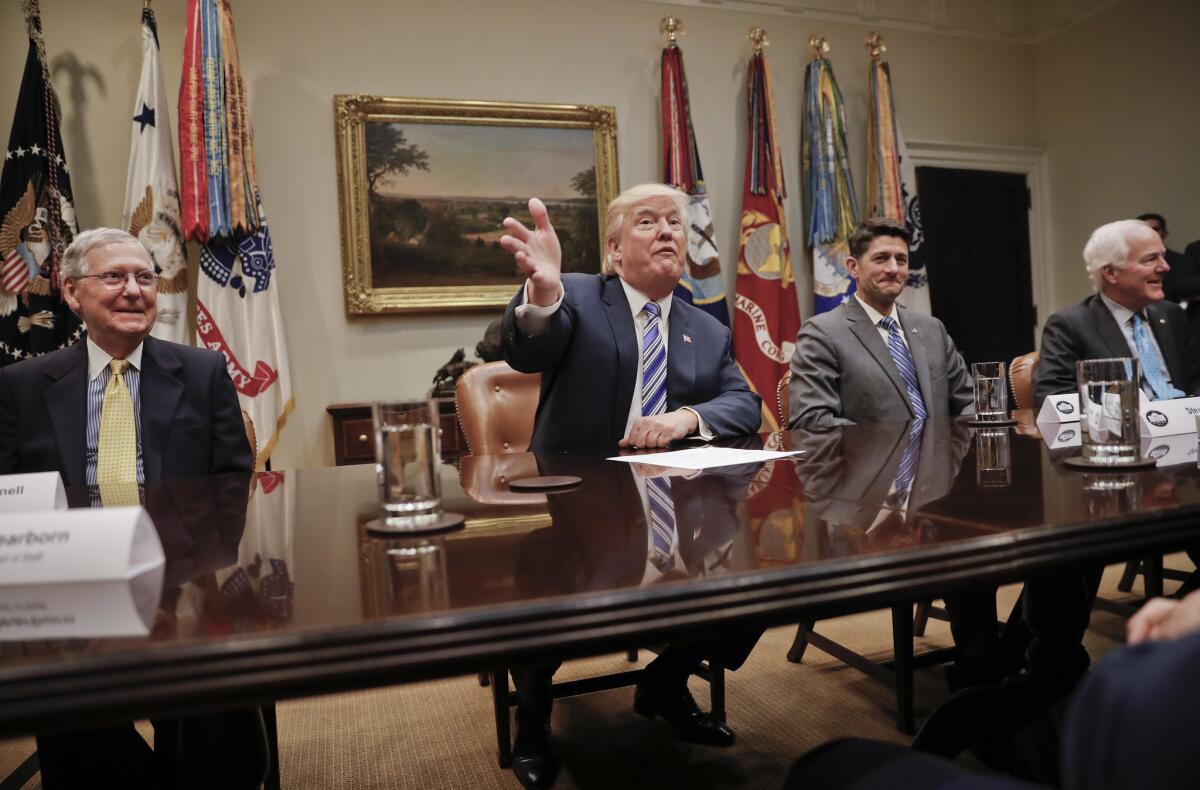Crunch time as Senate Republicans race the clock on Obamacare repeal — and the rest of Trump’s agenda

Reporting from Washington — President Trump summoned Republican leaders to the White House on Tuesday to discuss his summer legislative agenda, but progress is being stalled by the GOP’s inability to fulfill its long promise to repeal and replace Obamacare.
Lacking a consensus over how to gut the Affordable Care Act without leaving millions more Americans uninsured — as the House GOP’s bill would do — Senate Republicans now face a legislative logjam that could imperil other priorities, such as tax reform and infrastructure.
This week was expected to be a pivotal one for the healthcare overhaul, which lawmakers hope to finish before the July 4 break in order to move to other pressing issues. Among them is raising the debt ceiling to avoid defaulting on the nation’s bills, always a thorny political lift.
But glum senators emerged from a series of closed-door meetings Tuesday no closer to an agreement than they have been after weeks of private talks.
“The areas we have consensus on? Let’s see, Obamacare sucks,” said Sen. John Kennedy, a first-term Republican from Louisiana. “We may be working on this for a while.”
That echoed similarly pessimistic comments in recent days from Senate Majority Leader Mitch McConnell and Republican Sens. Lindsey Graham of South Carolina and Richard M. Burr of North Carolina. Some have speculated that leaders may be tempted to call a Senate vote on the bill even if they know it will fail, simply to move the issue off their plate for now.
Trump emphasized the importance of a healthcare vote in a pep talk to House Speaker Paul D. Ryan, McConnell and other leaders.
“At the core of this agenda is repealing and replacing the disaster known as Obamacare,” said Trump, who dined later Tuesday with House and Senate Republicans. He praised the House bill as a good first step. “Now the Senate, I’m sure, will follow suit and get a bill across the finish line this summer that will be great healthcare for Americans.”
But Republicans are staring down a legislative calendar with little to show for their hold on the House, Senate and White House. Usually, the first six months of a new presidency — especially with a Congress controlled by the same party — are prime time for legislating before the midterm campaign season begins.
But this year has been an exception, thanks in large part to Trump’s unusual leadership style and the deepening investigation into his campaign’s potential ties with Russian interference in the 2016 election. Trump’s own shifting policy positions have left Ryan and McConnell struggling to lead restive Republicans in a coherent strategy.
“We need to get some legislative accomplishments,” said Sen. John Cornyn of Texas, the No. 2 Republican.
The White House acknowledged that the Russia investigation had taken its toll. Questions swirl almost daily with developments on Capitol Hill, and more are expected this week when fired FBI Director James B. Comey testifies publicly before the Senate Intelligence Committee.
“There’s no doubt that keeping members focused on investigations detracts from our legislative agenda and detracts from what we’re trying to deliver to the American people,” said Marc Short, the White House legislative director, in a conference call with reporters this week. “To what extent, I think it’s hard for me to answer.”
Trump has not helped matters, lawmakers say, with his unfiltered tweets that often amplify and prolong story lines that a more disciplined leader would be able to quiet.
“I’ve said this before, I’m not a fan of the president’s tweets, and that still remains my view,” McConnell said Tuesday before heading to the White House.
The crux of the legislative stalemate is the inability of Republicans to deliver on their healthcare promise. Even though Ryan ushered the House GOP’s healthcare bill to passage in May, Senate Republicans dismissed the measure, in part because it is expected to leave 23 million more Americans without health insurance.
In trying to build their own bill, McConnell has jettisoned the traditional legislative process of committee hearings and expert testimony in favor of a closed-door approach among key senators who are most engaged on the issue.
Some Republicans, including Sen. Ted Cruz of Texas, praise this strategy. “One of the most encouraging aspects of these discussions is they have not been litigated in the press,” he told reporters Tuesday.
But others say a more open process, including one that didn’t rely on a procedural maneuver that will allow simple majority passage without any need to build bipartisan consensus with Democratic votes, would have been more productive.
“This is a really big mess, and a very complex system, and so you don’t do that in a couple of weeks,” said Sen. Ron Johnson (R-Wis.), who expects Republicans will need to provide a stopgap measure to stabilize insurance markets while they continue working on a broader overhaul. “I don’t like what we’re going to have to do, but I’m supporting doing that. I think it’s our responsibility.”
Senate Republicans face a series of difficult decisions in crafting the bill they hope to vote on by the end of the month, including how to protect older, sicker and lower-income consumers who would see huge insurance premium hikes under the House bill.
But no issue has proved more challenging than how to approach Medicaid, the half-century-old government safety-net plan for the poor that is a pillar of Obamacare’s coverage expansion.
While many Republicans have spent years pledging to cut Medicaid, they are now reluctant to undo the program that provides coverage to more than 70 million low-income Americans, including many of their constituents.
The House bill would slash more than $800 billion in federal Medicaid spending over the next decade, rolling back the expansion and capping future federal aid to states. It is considered among the largest entitlement program cuts in a generation.
But those cuts — decried by major physician and patient groups — have made a number of key Republican senators uncomfortable, including lawmakers from states that have expanded Medicaid, such as Nevada, Arizona, West Virginia and Ohio. Many states also rely on Medicaid for treatment in the opioid crisis.
Sen. John Barrasso (R-Wyo.) said senators were considering a longer “glide path” to cutting Medicaid than the House bill, pushing off the reductions until after 2020 — and the next presidential election.
If McConnell cannot bridge the Medicaid divide, he may have to refocus efforts on more limited legislation to rescue insurance markets across the country that have been battered by the political turmoil in Washington.
A growing number of insurers are leaving Obamacare markets or proposing steep premium increases next year, partly because of the law’s weaknesses but also now because the Trump administration refuses to commit to steps to keep them operating, such as enforcing a penalty on people who don’t get insurance and providing aid to low-income consumers.
On Tuesday, Anthem announced it was pulling out of Ohio’s Obamacare marketplace, leaving thousands without coverage on the private market.
That is becoming a growing political problem for Republican lawmakers, as polls indicate that Americans increasingly hold the GOP responsible for the fate of the nation’s insurance markets.
House Minority Leader Nancy Pelosi said Tuesday that Trump was “sabotaging” the healthcare law.
“The Affordable Care Act is the law of the land,” Pelosi said on CNN. “The president should be honoring the law of the land and funding it…. If the rates go up, that’s at his doorstep, because he has not obeyed the law of the land.”
ALSO
Trump wants a border wall, but few in Congress want to pay for it
With a push from Trump, House Republicans pass Obamacare overhaul
More coverage of politics and the White House
More to Read
Get the L.A. Times Politics newsletter
Deeply reported insights into legislation, politics and policy from Sacramento, Washington and beyond. In your inbox three times per week.
You may occasionally receive promotional content from the Los Angeles Times.












